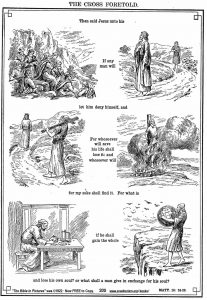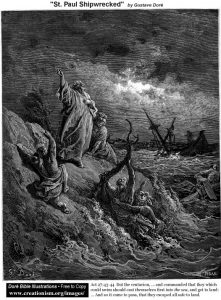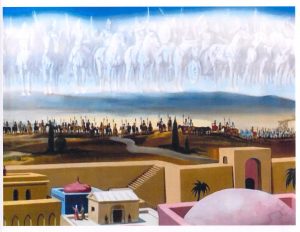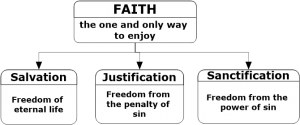
This is the fourth and final installment of my Thanksgiving 2020 message. It focuses on the third step in Paul’s stairway to a richer, fuller Christian life found in I Thessalonians 5:16-18. “In everything, give thanks.” [KJV]
The first thing we need to note about this injunction is that it says to be thankful in all and not for all. This makes a world of difference. Remember, the first step was to “rejoice always.” God wants us to be joyful.
Although we are called to suffer for the cause of Christ, we are not called to be masochists. Masochists cannot escape cycles of self-defeat. They find it impossible to enjoy pleasure without guilt or shame accompanying it. They feel hopeless about the future.

The Apostles were all aware of what was in their future. Jesus had clearly told them that they would suffer for his cause.
If any man will come after me, let him deny himself, and take up his cross, and follow me. For whoever desires to save his life will lose it, but whoever loses his life for My sake will find it.For what profit is it to a man if he gains the whole world, and loses his own soul? Or what will a man give in exchange for his soul? For the Son of Man will come in the glory of His Father with His angels, and then He will reward each according to his works. [Matthew 16:24-28, NKJV]

The Apostle Peter knew first hand about the trials and hardships that followers of Christ would suffer. According to Acts 12, Peter was imprisoned by King Herod Agrippa. Peter was awaiting sure persecution and possible execution. As the church prayed fervently, an angel miraculously saved him by walking him out past two guard posts and through an unlocked gate. In his letter to Christians in the far-flung expanses of the Roman empire, he wrote.
Dear friends, do not be surprised at the fiery ordeal that has come on you to test you, as though something strange were happening to you.But rejoice inasmuch as you participate in the sufferings of Christ, so that you may be overjoyed when his glory is revealed. If you are insulted because of the name of Christ, you are blessed, for the Spirit of glory and of God rests on you. If you suffer, it should not be as a murderer or thief or any other kind of criminal, or even as a meddler. However, if you suffer as a Christian, do not be ashamed, but praise God that you bear that name. For it is time for judgment to begin with God’s household; and if it begins with us, what will the outcome be for those who do not obey the gospel of God? [I Peter 4:12-17, NIV]

Paul’s journey as a minister of the gospel was not a walk in the park. In his first letter to the Corinthian church, he graphically described the trials he had endured.
Five different times the Jewish leaders gave me thirty-nine lashes. Three times I was beaten with rods. Once I was stoned. Three times I was shipwrecked. Once I spent a whole night and a day adrift at sea. I have traveled on many long journeys. I have faced danger from rivers and from robbers. I have faced danger from my own people, the Jews, as well as from the Gentiles. I have faced danger in the cities, in the deserts, and on the seas. And I have faced danger from men who claim to be believers but are not. I have worked hard and long, enduring many sleepless nights. I have been hungry and thirsty and have often gone without food. I have shivered in the cold, without enough clothing to keep me warm.
Despite the number or extent of our difficulties, we can always find reasons to thank God. They are outlined through all of the scriptures.
We can be thankful that all things work together for good if we are faithful followers of Him.
And we know that in all things God works for the good of those who love him, who have been called according to his purpose. [Romans 8:28, NIV]

We know that no matter what our circumstances, God’s grace is sufficient to carry us through them.
…There was given to me a thorn in the flesh, the messenger of Satan to buffet me, lest I should be exalted above measure. For this thing I besought the Lord thrice, that it might depart from me. And He said unto me, My grace is sufficient for thee: for My strength is made perfect in weakness. Most gladly therefore will I rather glory in my infirmities, that the power of Christ may rest upon me. (II Corinthians 12:7-9, KJV]
When trials come, we can be thankful that nothing can separate us from God’s love.
Who shall separate us from the love of Christ? Shall trouble or hardship or persecution or famine or nakedness or danger or sword? As it is written: “For your sake we face death all day long; we are considered as sheep to be slaughtered.” No, in all these things we are more than conquerors through him who loved us. For I am convinced that neither death nor life, neither angels nor demons, neither the present nor the future, nor any powers,neither height nor depth, nor anything else in all creation, will be able to separate us from the love of God that is in Christ Jesus our Lord. [Romans 8:35-39, NIV]

Just a few verses before this passage is the answer to the essence of Israel’s question. In any fight against evil and pain, who do you want on your side and in your corner?
What shall we then say to these things? If God be for us, who can be against us? [Romans 8:31, KJV]
This concept is not just a New Testament idea. When Paul says, “It is written,” he is quoting Psalm 44. This Psalm is a song of communal lament sung in the temple. Several times in their history, the people of Israel believed that God has forsaken or forgotten them because of the many trials and hardships they were facing. However, the song and Psalm concludes that God is still where He has always been. He is awake, in charge of the universe, and loves them. Since they still have access to Him, they cry out.
Rise up and help us; rescue us because of your unfailing love.[Psalm 44:26, NIV]

This Psalm reminds me of the opening complaint of the prophet Habakkuk.
How long, Lord, must I call for help, but you do not listen? Or cry out to you, “Violence!” but you do not save? Why do you make me look at injustice? Why do you tolerate wrongdoing? Destruction and violence are before me; there is strife, and conflict abounds. Therefore the law is paralyzed, and justice never prevails. The wicked hem in the righteous, so that justice is perverted. [Habakkuk 1:2-4, KJV]
God’s response to Habakkuk’s grievance could be an echo of His response to Israel’s complaint.
Then the Lord said to me, “Write my answer plainly on tablets, so that a runner can carry the correct message to others. This vision is for a future time. It describes the end, and it will be fulfilled. If it seems slow in coming, wait patiently, for it will surely take place. It will not be delayed. Look at the proud! They trust in themselves, and their lives are crooked. But the righteous will live by their faithfulness to God. [Habakkuk 2:2-4, NTL]
The last phrase, “The just shall live by faith,” is quoted three times in the New Testament. The three quotes provide three different perspectives and contexts to the idea of “living by faith.”

Paul quotes Habakkuk as he begins his letter to the Christians living in Rome with the very familiar verses.
I am not ashamed of the gospel of Christ: for it is the power of God unto salvation to every one that believeth; to the Jew first, and also to the Greek. For therein is the righteous of God revealed from faith to faith: as it is written, The just shall live by faith. [Romans 1:16-17, KJV]
Paul is obviously referring to the gospel and salvation. Thus, the life mentioned here is eternal life, which is available to us only by faith.
In Paul’s letter to the churches in Galatia, he again references the Old Testament precept in the middle of a discourse on the ineffectiveness of reliance on the law for justification, or right standing before God.
Clearly no one who relies on the law is justified before God, because “the righteous will live by faith.”The law is not based on faith; on the contrary, it says, “The person who does these things will live by them.”Christ redeemed us from the curse of the law by becoming a curse for us, for it is written: “Cursed is everyone who is hung on a pole.”He redeemed us in order that the blessing given to Abraham might come to the Gentiles through Christ Jesus, so that by faith we might receive the promise of the Spirit. [Galatians 3:10-14, NIV]

The third time the phrase is quoted occurs in Hebrews in the author’s introduction to his delineation of the Old Testament Faith’s Hall of Fame.
So do not throw away your confidence; it will be richly rewarded. You need to persevere so that when you have done the will of God, you will receive what He has promised. For “In just a little while, He who is coming will come and will not delay.” And, “But my righteous one will live by faith. And I take no pleasure in the one who shrinks back.” But we do not belong to those who shrink back and are destroyed, but to those who have faith and are saved.[Hebrews 10:35-39, NIV]
This passage is obviously referring to the perseverance and sanctification of the saints. We can continue to live and be made holy by continuing in the faith.

Thus, faith is our only avenue to salvation [eternal life], the forgiveness of sins [justification], and freedom from the power of sin [santicification]. Faith is how we entered into a relationship with God through Jesus. It is also how that relationship grows and deepens. We must thank God for his faithfulness and for giving us the faith to believe.
Throughout scriptures, there are many other reasons to thank God in every circumstance. In this post, I will focus on one more. The ideas of praising, worshipping, and thanking God are inextricably linked together. They are woven into one fabric that cannot be separated.
Psalm 100, one of the most loved and well-known Psalms, captures the essence of this idea. It is the only Psalm with the short and sweet inscription, “A psalm of thanksgiving.”
Make a joyful noise unto the Lord, all ye lands. Serve the Lord with gladness: come before His presence with singing. Know ye that the Lord he is God: it is He that hath made us, and not we ourselves; we are His people, and the sheep of His pasture. Enter into his gates with thanksgiving, and into His courts with praise: be thankful unto Him, and bless His name. For the Lord is good; His mercy is everlasting; and His truth endureth to all generations. [Psalm 100, KJV]
Since this Psalm invites and demands that we sing unto the Lord, I will close this post with two hymns that encapsulate the idea of thanking God in everything.

The first is one of 6500 hymns composed by Charles Wesley, an 18th-century Methodist minister. Since Wesley didn’t always title his hymns, this one goes by two titles, “And can it be” or “Amazing love!” These titles come from the opening lines of the first verse and the refrain.
And can it be that I should gain
An int’rest in the Savior’s blood?
Died He for me, who caused His pain—
For me, who Him to death pursued?
Amazing love! How can it be,
That Thou, my God, shouldst die for me?
Refrain:
Amazing love! How can it be,
That Thou, my God, shouldst die for me?’Tis myst’ry all: th’ Immortal dies:
Who can explore His strange design?
In vain the firstborn seraph tries
To sound the depths of love divine.
’Tis mercy all! Let earth adore,
Let angel minds inquire no more.He left His Father’s throne above—
So free, so infinite His grace—
Emptied Himself of all but love,
And bled for Adam’s helpless race:
’Tis mercy all, immense and free,
For, O my God, it found out me!Long my imprisoned spirit lay,
Fast bound in sin and nature’s night;
Thine eye diffused a quick’ning ray—
I woke, the dungeon flamed with light;
My chains fell off, my heart was free,
I rose, went forth, and followed Thee.No condemnation now I dread;
Jesus, and all in Him, is mine;
Alive in Him, my living Head,
And clothed in righteousness divine,
Bold I approach th’ eternal throne,
And claim the crown, through Christ my own.

The second hymn was voted as the second most all-time favorite hymn in a Christianity Today survey in 2001. It is based on a poem written by Carl Boberg in 1885 and set to music using a traditional Swedish melody. The English version came to us, as the original Swedish version was translated into German and then Russian by missionaries. It was translated into English by Stuart K. Hine. During Billy Graham’s England crusades, George Beverly Shea and Cliff Barrows worked with Hine on an arrangement that they could use as an introductory piece. With all that information, you probably have guessed that it is the hymn How Great Thou Art.
O Lord my God, when I in awesome wonder
Consider all the worlds Thy hands have made,
I see the stars, I hear the rolling thunder,
Thy power throughout the universe displayed:
Then sings my soul, my Savior God, to Thee:
How great Thou art, how great Thou art!
Then sings my soul, my Savior God, to Thee;
How great Thou art, how great Thou art!
And when I think that God, His Son not sparing,
Sent Him to die, I scarce can take it in;
That on the cross, my burden gladly bearing,
He bled and died to take away my sin.
When Christ shall come with shout of acclamation
And take me home, what joy shall fill my heart!
Then I shall bow in humble adoration.
And there proclaim, my God, how great Thou art!
Then sings my soul, my Savior God, to Thee:
How great Thou art, how great Thou art!
Then sings my soul, my Savior God, to Thee;
How great Thou art, how great Thou art!
How great Thou art!
Leave a Reply